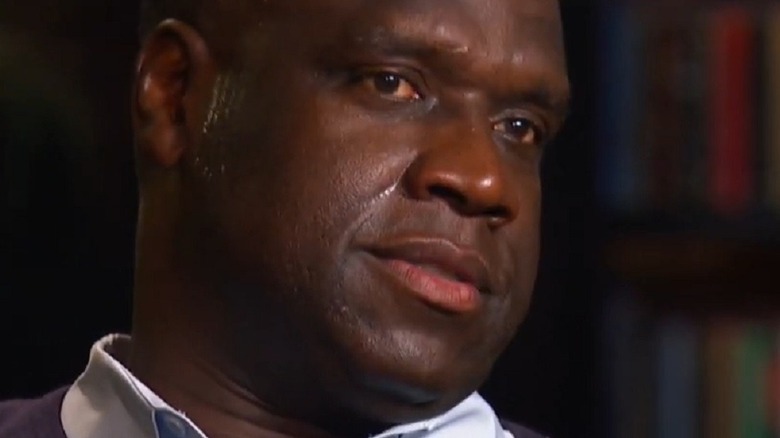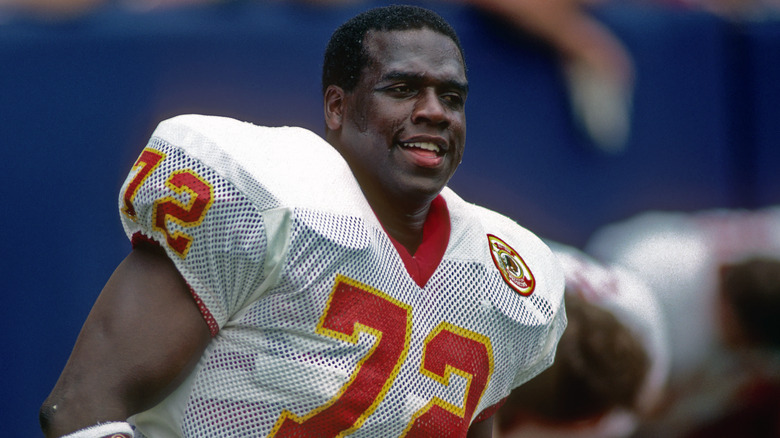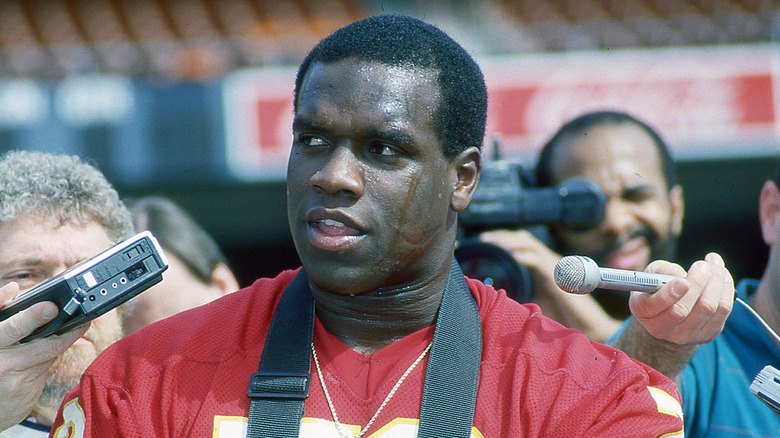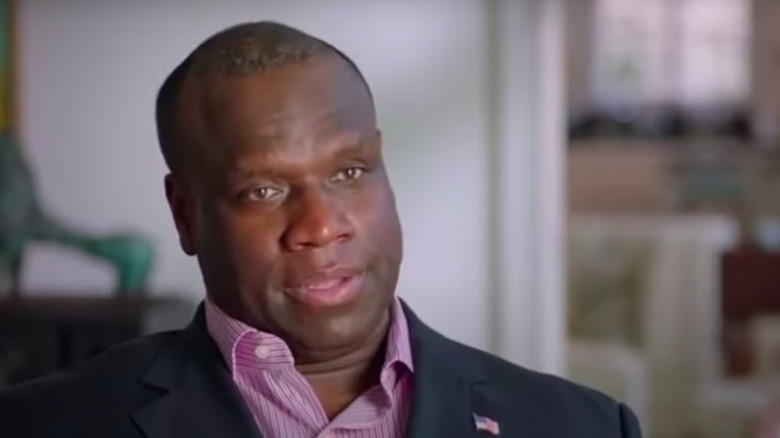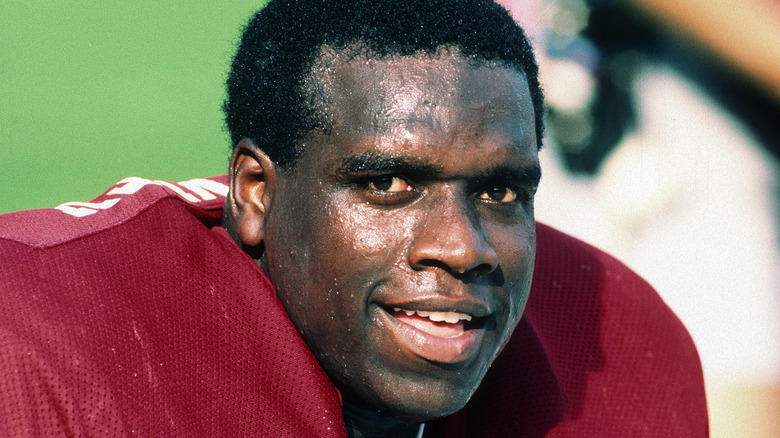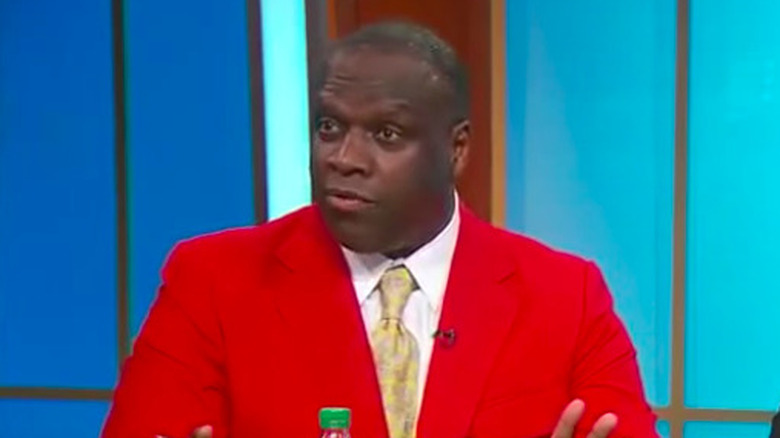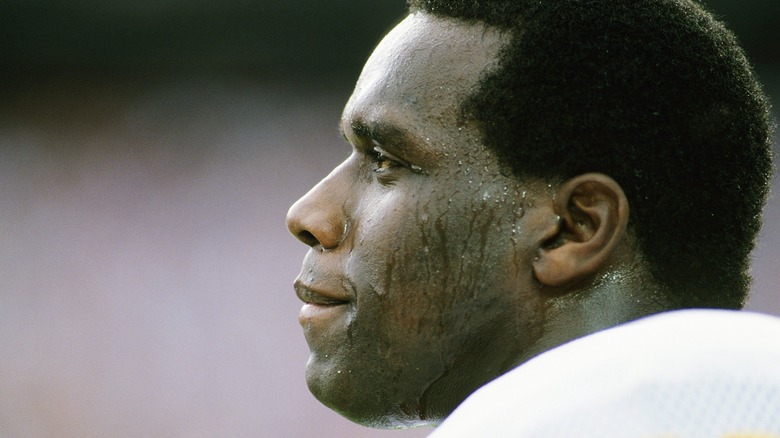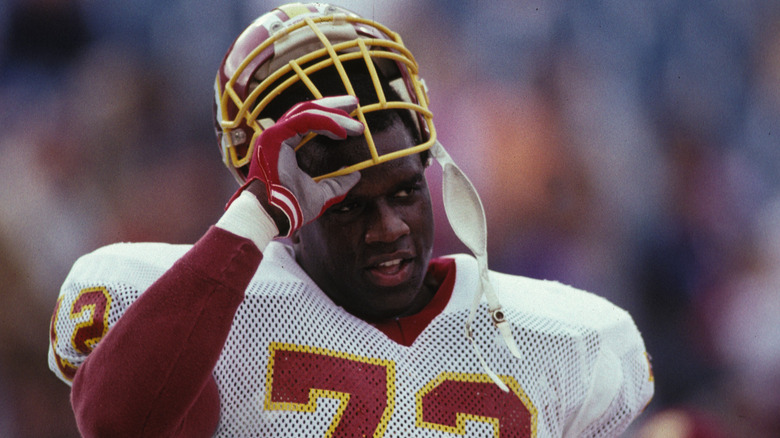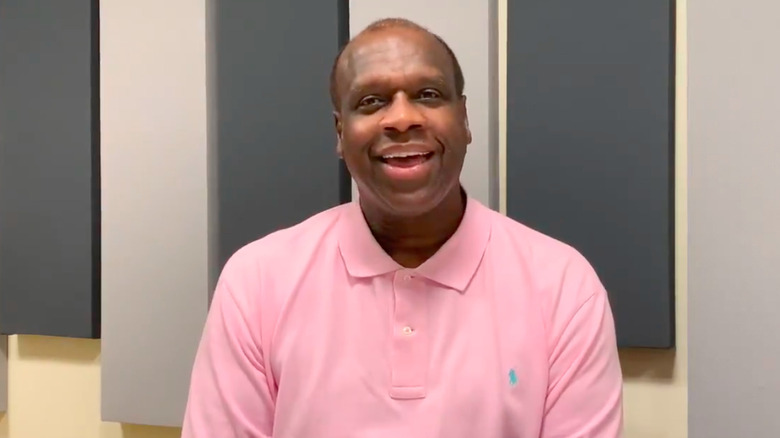NFL Star Dexter Manley Can't Catch A Break
The following article references drug and alcohol addiction.
Dexter Manley has a life made for a movie, with a story featuring everything a viewer would love from a biopic: professional highs, many personal lows, and the resilience to turn his life around. In fact, the NFL covered his illustrious career and inspiring story in the 2015 special "A Football Life: Dexter Manley." Football fans may love the former Washington Redskins defensive end for his dominance on the field, trash-talking, and his franchise record of 18.5 sacks in a single season. Manley did it all on the field, but during his career, his accomplishments weren't the only things making headlines.
During the late 1980s and 1990s, Manley's well-documented sobriety issues not only left the professional athlete homeless but also banished him from a sport he gave so much to. There have been many bumps in the road toward success, and to his credit, the two-time Super Bowl champ has never shied away from talking about them or taking accountability. Instead, he has used his life story to inspire others.
Starting in his childhood, the game of life was never easy for him, but the man — now in his 60s — is grateful that he has beaten the odds. Here are the toughest battles Manley has fought off the field.
As a child, he didn't know how to read
Dexter Manley was born in Houston, Texas in 1959. Long before he was shining under the lights on a football field, he was a young child in a classroom. During elementary school, Manley struggled to read at the same pace as his peers. Manley kept this a secret and avoided reading in a classroom, per Commanders. When asked to read, he would often lie by telling his teachers he left his glasses at home –- despite not needed them. By the time he reached the second grade, he'd amassed a slew of failing grades, per The Washington Post.
He was not only forced to repeat the grade, but the school decided to move him out of the regular classroom. "In special education classes, you're going to move on," Manley told The Baltimore Sun in 1992. "I knew I couldn't read and write, but in seventh grade, you don't tell that to your friends." In fact, Manley didn't tell anyone because he feared he would continue being held back until he was too old to play football.
Through high school and college, Manley continued to keep his illiteracy a secret and admits to making it through the education system by copying off his peers and pretending to read assigned books. His struggles in the classroom later led to behavior issues at school. The self-described "bada**" admitted that he fought with other kids in elementary school.
The football star felt like a loner in college
Being a football star at a college is practically being a celebrity. According to The Washington Post, Dexter Manley attended Oklahoma State University on an athletic scholarship. While there, Manley would receive little playing time and make zero friends. He skipped out on homecoming parties and often cried in his dorm room due to intense feelings of loneliness. "I was a big man, you know?" he told Sports Illustrated. "But I was a kid, too. I felt alone."
Despite being on a football team, he never felt camaraderie with his teammates. From feeling alone and trying to live up to the image of a football player, Manley adopted a larger-than-life persona with flashy cars and jewelry. However, that intimidating image led him to clash with a few students on campus. During his freshman year, Manley got into an argument with students while parking his new car.
"They said I was too cocky," Manley recalled. "But they really weren't happy with themselves. I was driving a brand new car, and they were driving some wreck." After exchanging a few words, Manley went home, changed his clothes, and met back up with them to fight. Manley admitted to winning the fight until suddenly, he felt a sharp pain in his cheek. One of the students he fought had a hidden razor blade and used it to slice him. The large cut needed 18 stitches. Ouch.
Dexter Manley suffered two major losses
Winning on the field didn't mean everything was great off the field for Dexter Manley. While attending college at Oklahoma State, Manley's home life was falling apart. During his first summer at the university, Dexter received the devastating news that his father, Carl Manley, passed away from colon cancer, per Sports Illustrated. Before his death, Carl kept his condition a secret from his family. Dexter knew something was wrong due to his dad's rapid weight loss but had no idea how severe the illness was. After Carl's passing, Dexter suffered from deep guilt due to their estranged relationship.
Prior to his father's death, Dexter discovered his then-girlfriend was pregnant and felt compelled to marry her. Carl expressed disapproval and warned him to not go through with the marriage. In fear of disappointing his dad, he went through with the marriage but ended up keeping it a secret from him. Two weeks before his death, Carl found out about the marriage and was furious. Dexter recalled feeling guilty the minute he heard the news. "My father passed away knowing that I did something behind his back," he said.
Months later, Dexter's 22-year-old brother Reggie, who had begun to hang around a rough crowd, was on the way to a friend's house when he was killed during a robbery.
He began abusing drugs and alcohol
Dexter Manley's first experience with drugs occurred during his rookie year with the Washington Redskins in 1981. While at a teammate's house, Manley observed the veteran flaunt his lavish lifestyle of cars, money, and women. The rookie was astonished when the unnamed player left the room to do cocaine and sleep with women. "I thought, 'This guy has got to be the baddest dude ever. How do you get that?'" Manley recalled to SB Nation. "I was just floored. I was like, 'Is this what happens in the National Football League? I wanna do that.'" As a rookie, he stayed clean due to a lack of access to drugs, but a year later he was regularly doing cocaine and abusing alcohol.
In 1987, the defensive end checked into rehab for alcoholism, per The Washington Post. At the time, the NFL was regularly drug testing its stars, and Manley's life off the field caught up with him. He failed two drug tests in 1987 and 1988. In 1991, he got a third strike after failing another drug test. Following the third failed test, the NFL issued him a ban. In 1990, he was reinstated but it didn't last long. He failed a fourth drug test and officially retired due to a looming lifetime ban. "I knew what was at stake," said Manley through tears at the press conference.
If you or anyone you know needs help with addiction issues, help is available. Visit the Substance Abuse and Mental Health Services Administration website or contact SAMHSA's National Helpline at 1-800-662-HELP (4357).
The NFL player dealt with legal and financial troubles
After retiring from the league in 1991, Dexter Manley was no longer a star on the field. The retired footballer was now trying to figure out who he was beyond sports. Post-retirement, his addiction worsened and Manley was regularly leaving his family to go on drug sprees. His then-wife kicked him out and filed for divorce, per SB Nation. By 1994, he was homeless and spending all his money to feed his addiction. The two-time champ even pawned off his Super Bowl ring to purchase drugs.
He had four run-ins with the police, including a 1995 arrest for drug possession. According to The Washington Post, the arrest occurred after Manley made a phone call to WTTG-TV-5 sportscaster Steve Buckhantz and said things that alarmed him. Manley reportedly threatened suicide and requested that Buckhantz later spread his ashes over RFK stadium. Worried for his friend's well-being, Buckhantz immediately phoned the police, who later found Manley in a Houston hotel with drugs. The ex-football player served 15 months in jail.
In 2002, he was convicted of evidence tampering from a 2001 arrest and was sentenced to two years in jail, per The New York Times.
If you or anyone you know is having suicidal thoughts, please call the National Suicide Prevention Lifeline by dialing 988 or by calling 1-800-273-TALK (8255).
He publicly admitted he was illiterate
In 1985, Dexter Manley's life changed on the field. The athlete stood on the sidelines and watched his teammate, Joe Theismann, suffer a career-ending injury. As he watched Theismann's leg break during a tackle, Manley was forced to confront the expiration date of his own career. Manley began to ponder what he would do outside the sport, and how would he accomplish things without knowing how to read? At 28, Manley was still carrying the secret of being illiterate. He somehow made it far in his professional playing career without knowing how to read a playbook or a highway sign. But it was his teammate's injury that convinced him things had to change.
"When I came to D.C. in 1981, I could not get off this beltway because I couldn't read and write," he revealed to SB Nation. "I didn't know where to go, I didn't know how to get off. Where do I live?" Manley bravely confronted his illiteracy and began to take night classes at The Lab School of Washington. Manley not only privately achieved his goal of learning to read, but he publicly used his platform to shed light on it. In 1989, he tearfully shared his story at the U.S. Senate in hopes of helping pass the Illiteracy Elimination Act of 1989, per Los Angeles Times.
Manley believes there was power in sharing his story with the world. "The truth always sets you free to soar as high as you were born to soar," he said (via Commanders).
Dexter Manley needed brain surgery
In 1986, Dexter Manley collapsed in a department store and was rushed to the hospital. While there, doctors gave him some scary news –– there was a cyst located on his brain. Despite neurologists suggesting surgery in the future to remove it, the football player wasn't too eager. "I wanted to play football," he explained in a 2015 interview to SB Nation. "Brain surgery? I didn't think about it. I was always bigger, faster, stronger than most of my colleagues. I just didn't want to face that. So I ignored it." As Manley went on with his life, the cyst began to grow.
In 2005, Manley had a drug relapse, and police found him wandering the streets of D.C. His behavior alarmed them, so they decided to bring him to the hospital for evaluation. Manley's scans revealed the cyst on his brain had grown to the size of a quarter. In 2006, he underwent two successful brain surgeries to remove the cyst. The surgery didn't just save his life; it helped him maintain his sobriety too. According to doctors, the cyst was located in the part of the brain that's associated with impulse control.
In 2012, Manley joined other former NFL players and sued the league for their negligence on concussions. "I had a 12 and a half hour brain surgery in 2006, and I'm recovering ... and that's related to football," Manley explained to The Washington Times.
He was hospitalized after testing positive for Coronavirus
In March 2020, the Coronavirus pandemic wrecked havoc on the lives of people everywhere. In May of that year, Dexter Manley tested positive for COVID and was hospitalized. The news left football fans worried about his condition. During his hospitalization, his wife Lydia provided frequent updates about his well-being to his former teammate John Riggins. Riggins took to his podcast "Riggo The Diesel" and provided fans with encouraging news. "He is doing much better," Riggins said. "I'm not sure he was ever really that ill, but his oxygen levels were a little low, they put him on oxygen, he has never been on a ventilator. All of this stuff is improving as we speak. He's still got a little ways to go" (via Commanders).
It wasn't long before Washington fans heard from the man himself. In June 2020, the 61-year-old posted a special message to Twitter. He hopped in front of the camera to thank everyone for their concern. With his classic charm, he let his fans know he did battle COVID, but as usual, the two-time Super Bowl champ came out on top. "I'm back and you can't keep a good man down," Manley said with a smile. "Coronavirus is no joke, take it seriously. We want everybody to be safe."

